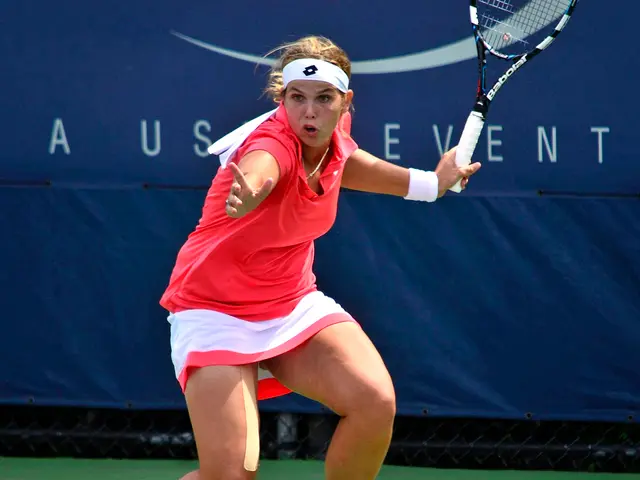Hey there! Let's dive into the current state of play for Ukrainian refugees in Europe.
Alterations in refugee allowance and rental assistance for Ukrainians across Europe: An overview of shifting benefits
With Russia's ongoing war in Ukraine entering its fourth year, the number of Ukrainians seeking asylum in Europe seems to be on a downward trend. At present, the EU is hosting over 4.3 million Ukrainian refugees, with 254,000 more in the UK alone, and tens of thousands more across other extra-EU countries.
February showed the lowest number of new asylum decisions (41,435) by the EU since the start of the full-scale invasion, marking a 25% drop since February 2024, according to Eurostat.
Germany has the highest share of these refugees, with nearly 1.8 million, or 27.3% of the bloc's total. Two weeks ago, Berlin became the latest European capital to announce changes to asylum allowances and other benefits for this group of asylum seekers.
But what's the situation in other countries?
Hungary: State-funded accommodation abandoned, allowances extended
Hungary has canceled state-funded accommodation for Ukrainian refugees coming from western parts of the country, which it now considers safe. Around 3,000 refugees, mostly women and children, have been affected. Yet, Hungary has extended Temporary Protection cards until 4 March 2026, regardless of the validity date physically displayed on the card. Refugees receive 22.800 HUF (around €55) monthly, with an additional 13.700 HUF (around €34) per child.
Poland: Host allowance and refugee payment discontinued
Poland, the country with the second-highest number of Ukrainian refugees, has extended the legal stay period for asylum seekers who left Ukraine after 24 January 2022 to 30 September 2025. However, people hosting or offering food to Ukrainian refugees are no longer eligible for cash compensation. Accommodation can still be arranged with local authorities. Also, a one-off PL300 payment (around €70) has been terminated.
Norway: Tightened child benefits in response to 'unsustainable' arrivals
Norway tightened benefit schemes shortly after the beginning of the full-scale invasion, aiming to tackle what it called an unsustainable number of arrivals. The government cut child benefits and restricted the opportunity for people with temporary collective protection to travel between Ukraine and Norway. It also limited the use of hotels as asylum reception centres and warned refugees who want to access the country's National Insurance Scheme that they would need to meet residency duration requirements.
Slovakia: Cuts to accommodation and allowances
At the beginning of March, Slovakia implemented new rules for Ukrainians who arrived after 28 February 2025. The maximum time for which they are eligible to stay in asylum facilities was reduced to 60 days from the previous 120, and this accommodation allowance is now available only for their first 60 days in the country.
Estonia: Six-month deadline for housing aid
Every Ukrainian refugee household can claim a lump €1,200 reimbursement to cover rental costs. However, new rules require that the reimbursement application be submitted within the first six months after the first residence permit was granted.
Austria: Residence rights extended with requirements for Red-White-Red Card Plus
Austria has extended Ukrainian refugees' residence rights until 4 March 2026. Ukrainian refugees with the so-called Blue Card can now apply for the Red-White-Red Card Plus (Rot-Weiß-Rot-Karte plus), which allows them to live and work in Austria. Requirements include an A1 level of German, providing proof of income, and a record of having worked in Austria with full insurance for at least 12 months in the last 24 months before applying.
Ireland: Homeowner allowance to be cut by 25%
Ireland is planning to cut a tax-free payment for people hosting Ukrainian refugees from €800 to €600 in June. The scheme has been extended through to March 2026.
Belgium: Subsidies for sleeping hubs phased out
Belgium's Dutch-speaking region of Flanders announced the end of subsidies for private sleeping spots after 1 January 2025. On the other hand, public authorities with at least five Ukrainian refugees will receive a €1,000 lump sum for each asylum seeker hosted, if they host at least five and are registered as a hosting spot by 1 January 2025.
Germany: Incoming refugees to be supported under a different benefit system
Ukrainian refugees who entered Germany after 1 April 2025 will no longer receive the Citizen's Allowance (Bürgergeld). They will be supported under the Asylum Seekers Benefits Act (Asylleistungen) instead.
Bulgaria and Czech Republic: Deadline to renew temporary protection card and stricter residency scheme requirements
Bulgarian authorities extended temporary protection status for Ukrainian refugees till 4 March 2026. however, temporary protection cards that have already been issued must be renewed by 30 April 2025. Last month, Prague approved a new long-term residence scheme available to Ukrainians who earn over CZK 440,000 (€17,551) gross annually, have been living in the country under temporary protection for at least two years, and haven't received benefits since last July.
Italy and France: Extended accommodation services and ongoing financial support
The monthly allowance for Ukrainian refugees in Italy is €300 per adult, plus another €150 for each accompanied minor under 18. Refugees are hosted in hotels or private accommodations across the country. Reception services will be available nationwide until 31 December 2025. In France, Ukrainian refugees receive an ADA (Asylum Seeker Allowance) at the beginning of the month through a payment card, and are eligible to receive around €426 a month, with extra support for renting private housing or finding a dedicated accommodation center.
Spain and the Netherlands: Financial support and varying allowances
Spain has approved a €400 allowance for each adult Ukrainian refugee, plus €100 per minor, for a duration of six months. In the Netherlands, both adults and children are eligible for a monthly subsistence allowance for clothing and food, as well as an extra allowance that can be used for public transport, visiting family, or taking part in sports. Once a refugee aged 18 or older gets a job, the allowance stops for all family members.
Portugal: Temporary protection status and social integration income
Ukrainians with refugee status in Portugal are granted a temporary protection title, which automatically includes a temporary residence permit, a tax identification number, a social security identification number, and a national health service user number. The temporary protection title allows them to be entitled to the social integration income (RSI) as long as their monthly income is up to €237.25 and their combined financial assets do not exceed €30,555.60. An RSI applicant will receive €237.25, with an additional €166.88 for a second adult. For refugees with children under the age of 18, there is an added amount of €118.63 per child.
Ukrainian refugees can also apply for unemployment benefits to compensate for involuntary job loss. This benefit amounts to €522.50 for beneficiaries living in a household or €418 for single beneficiaries. Portugal has a dedicated platform for refugees from Ukraine to look for a job ("Portugal for Ukraine") and a support line available in Ukrainian.
- Agnieszka, a journalist, received general-news updates about the lifestyle changes for Ukrainian refugees in Europe, particularly the reduction in benefits and allowances in several countries.
- Eurostat data shows a 25% decrease in new asylum decisions for Ukrainian refugees in February compared to February 2024, suggesting a trend towards fewer refugees seeking asylum.
- Despite some countries reducing benefits, sports continue to play an important role in the lives of several refugees, with opportunities provided in various accommodations and reception centers across Europe.
- As news about the changes to the support system for Ukrainian refugees spreads, public opinion shows a general agreement that a balanced approach should be taken to ensure both the well-being of the refugees and the sustainability of the systems supporting them.










